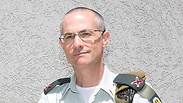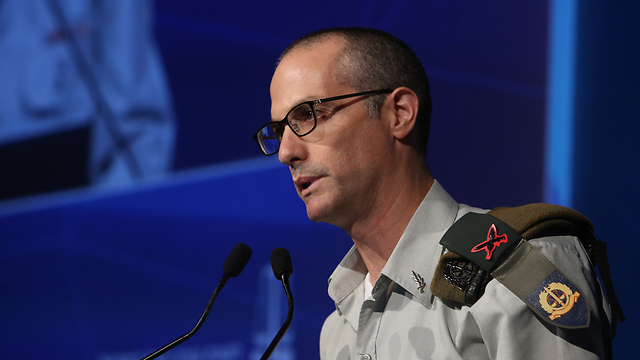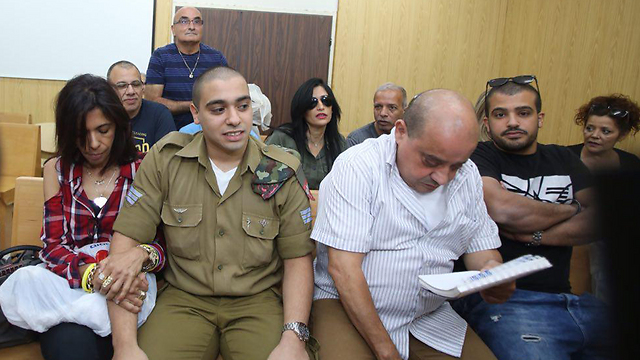
Military advocate general is first senior IDF official to come out of the closet
Brig. Gen. Sharon Afek becomes first member of the General Staff to openly discuss his sexual orientation; 'It's important to me that young LGBT men and women who enlist know there are no glass ceilings in the IDF to limit them. Their success is dependent upon them, and them alone.'
Military Advocate General Brig. Gen. Sharon Afek has become the first senior IDF official to come out of the closet.
"From the beginning of my service in the IDF, I've never encountered discrimination or preferential treatment because of my sexual orientation," Afek told the Israel Bar Association's journal in an interview.
"When I was a young officer, the times were different, and I was worried it will work against me, and that I'll encounter a glass ceiling," he said. "Fortunately, it wasn't an issue, and I never felt like my sexual orientation was a consideration in decisions made about me, and that's a good thing."
Afek told the journal that "it's important to me to serve as a role model. Many young men and women in the LGBT community are about to enlist in the IDF or are already serving in the IDF. Even today, in 2017, we encounter expressions of ignorance and hatred towards an other. It's important to me that these young men and women know there are no glass ceilings in the IDF to limit them. Their success is dependent upon them, and them alone. They can reach the top of the pyramid, each in their field, based on their abilities and skills. The IDF is the military of the people, which embraces anyone who wants to contribute and grow within it. I'll be happy if many women and men follow my lead."
Azaria trial: 'Our choices will stand the test of time'
Afek, who found himself in the eye of the storm when he decided to prosecute IDF soldier Elor Azaria, said he was sure the case will be remembered as "a judicial and moral milestone in the history of military law."
Azaria was convicted of manslaughter after he shot dead a seriously wounded terrorist who was lying on the ground. He was sentenced to 18 months in prison and is now appealing the conviction.
In his first comment on the trial since it began, Afek said he was "confident our choices will stand the test of time."
"Parts of the public have a hard time accepting a case in which a combat soldier is being prosecuted," the military advocate general said. "In this case, while the terrorist was trying to stab soldiers, it was allowed and necessary to shoot him. But Azaria was not allowed to shoot him 11 minutes later, after the terrorist had already been neutralized."
Afek explained that "as far as public interest is concerned, the Military Advocate General has the duty to order an indictment, as the defendant's alleged actions seemingly hurt protected values, both military and civilian: the sanctity of life and the purity of arms."
Despite the high tensions in the country during and in the wake of the trial, Afek is of the opinion the trial was managed in a reasonable, professional and unbiased manner. "We didn't let the public debate and background noises affect professional considerations and the decision-making," he said.
Afek dismissed opinion polls that showed many Israelis opposed the decision to indict Azaria, reiterating that his decisions were made based on evidence in the case, legal policy and precedents and not on gut instincts or considerations of popularity. "In Azaria's case, all of those led to an unequivocal conclusion that we must prosecute the soldier," he said.
The military advocate general also rejected claims that the decision to prosecute Azaria undermines public trust in the military justice system. "Even though there were parts of the public who did not like the decision and criticized it, criticism is a healthy thing," Afek said. "We're not immune to criticism and we don't seek such immunity. I still believe the public at large understands that this is a decision made by a professional and impartial system."
He also stressed that condemnations of Azaria's actions made immediately following the incident by former defense minister Moshe Ya'alon and IDF Chief of Staff Gadi Eisenkot did not affect the legal process.
"Moreover, there is no one in the defense establishment that tells me 'I want you to act this way or another,'" he said. "The military prosecution and the military courts are not professionally subordinate to any senior official, and there is no concern of bias. All of the decisions we made were based on the evidence and legal principles."
Afek asserted that the decision to prosecute Azaria will not hurt soldiers' motivation to serve in combat units or in their determination to act against the enemy on the moment of truth.
"I tour and visit the field quite often. I go to combat units and have a lot of conversations with combat soldiers and officers. It is my impression that they know to distinguish between a case in which a soldier made a professional error, and this case, which is different and unusual, in which a soldier fired without justification and without operational necessity."
He pointed to dozens of incidents since Azaria's in which terrorists attacked soldiers, and the troops acted "with the required courage and determination."
Afek stressed that "the fact we are making a statement that even against the worst kind of enemy—a terrorist who tried to murder soldiers—there is no justification to use weapons when the terrorist no longer poses a threat, is important and significant."


















